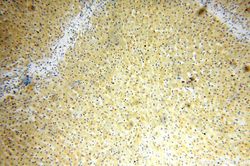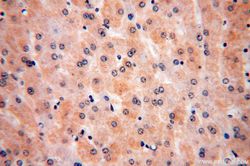Antibody data
- Antibody Data
- Antigen structure
- References [11]
- Comments [0]
- Validations
- Western blot [1]
- Immunohistochemistry [2]
Submit
Validation data
Reference
Comment
Report error
- Product number
- 17715-1-AP - Provider product page

- Provider
- Proteintech Group
- Proper citation
- Proteintech Cat#17715-1-AP, RRID:AB_2214685
- Product name
- ULBP1 antibody
- Antibody type
- Polyclonal
- Description
- ULBP1 antibody (Cat. #17715-1-AP) is a rabbit polyclonal antibody that shows reactivity with human, mouse and has been validated for the following applications: IHC, WB, ELISA.
- Reactivity
- Human, Mouse
- Host
- Rabbit
- Conjugate
- Unconjugated
- Isotype
- IgG
- Vial size
- 20ul, 150ul
Submitted references Exosomes Derived from Meningitic Escherichia coli-Infected Brain Microvascular Endothelial Cells Facilitate Astrocyte Activation.
Identification of a potential signature to predict the risk of postmenopausal osteoporosis.
Unlocking the power of immunotherapy: Combinatorial delivery of plasmid IL-15 and gemcitabine to synergistically remodeling the tumor microenvironment.
Pleckstrin-2 promotes tumour immune escape from NK cells by activating the MT1-MMP-MICA signalling axis in gastric cancer.
γδ-Enriched CAR-T cell therapy for bone metastatic castrate-resistant prostate cancer.
Venetoclax enhances NK cell killing sensitivity of AML cells through the NKG2D/NKG2DL activation pathway.
Engineered Three-Dimensional Tumor Models to Study Natural Killer Cell Suppression.
Dormancy and NKG2D system in brain metastases: Analysis of immunogenicity.
The PI3K/Akt/GSK-3β/ROS/eIF2B pathway promotes breast cancer growth and metastasis via suppression of NK cell cytotoxicity and tumor cell susceptibility.
IDO1 impairs NK cell cytotoxicity by decreasing NKG2D/NKG2DLs via promoting miR-18a.
NKG2D ligands in glioma stem-like cells: expression in situ and in vitro.
Yang R, Qu X, Zhi S, Wang J, Fu J, Tan C, Chen H, Wang X
Molecular neurobiology 2024 Sep;61(9):7195-7210
Molecular neurobiology 2024 Sep;61(9):7195-7210
Identification of a potential signature to predict the risk of postmenopausal osteoporosis.
Geng Y, Shao R, Xu T, Zhang L
Gene 2024 Feb 5;894:147942
Gene 2024 Feb 5;894:147942
Unlocking the power of immunotherapy: Combinatorial delivery of plasmid IL-15 and gemcitabine to synergistically remodeling the tumor microenvironment.
Liu J, Han Y, Zhao M, Wang L, Hu H, Chen D
International journal of pharmaceutics 2024 Apr 25;655:124027
International journal of pharmaceutics 2024 Apr 25;655:124027
Pleckstrin-2 promotes tumour immune escape from NK cells by activating the MT1-MMP-MICA signalling axis in gastric cancer.
Mao D, Zhou Z, Chen H, Liu X, Li D, Chen X, He Y, Liu M, Zhang C
Cancer letters 2023 Sep 28;572:216351
Cancer letters 2023 Sep 28;572:216351
γδ-Enriched CAR-T cell therapy for bone metastatic castrate-resistant prostate cancer.
Frieling JS, Tordesillas L, Bustos XE, Ramello MC, Bishop RT, Cianne JE, Snedal SA, Li T, Lo CH, de la Iglesia J, Roselli E, Benzaïd I, Wang X, Kim Y, Lynch CC, Abate-Daga D
Science advances 2023 May 3;9(18):eadf0108
Science advances 2023 May 3;9(18):eadf0108
Venetoclax enhances NK cell killing sensitivity of AML cells through the NKG2D/NKG2DL activation pathway.
Wu HY, Li KX, Pan WY, Guo MQ, Qiu DZ, He YJ, Li YH, Huang YX
International immunopharmacology 2022 Mar;104:108497
International immunopharmacology 2022 Mar;104:108497
Engineered Three-Dimensional Tumor Models to Study Natural Killer Cell Suppression.
Temples MN, Adjei IM, Nimocks PM, Djeu J, Sharma B
ACS biomaterials science & engineering 2020 Jul 13;6(7):4179-4199
ACS biomaterials science & engineering 2020 Jul 13;6(7):4179-4199
Dormancy and NKG2D system in brain metastases: Analysis of immunogenicity.
Flüh C, Mafael V, Adamski V, Synowitz M, Held-Feindt J
International journal of molecular medicine 2020 Feb;45(2):298-314
International journal of molecular medicine 2020 Feb;45(2):298-314
The PI3K/Akt/GSK-3β/ROS/eIF2B pathway promotes breast cancer growth and metastasis via suppression of NK cell cytotoxicity and tumor cell susceptibility.
Jin F, Wu Z, Hu X, Zhang J, Gao Z, Han X, Qin J, Li C, Wang Y
Cancer biology & medicine 2019 Feb;16(1):38-54
Cancer biology & medicine 2019 Feb;16(1):38-54
IDO1 impairs NK cell cytotoxicity by decreasing NKG2D/NKG2DLs via promoting miR-18a.
Zhang J, Han X, Hu X, Jin F, Gao Z, Yin L, Qin J, Yin F, Li C, Wang Y
Molecular immunology 2018 Nov;103:144-155
Molecular immunology 2018 Nov;103:144-155
NKG2D ligands in glioma stem-like cells: expression in situ and in vitro.
Flüh C, Chitadze G, Adamski V, Hattermann K, Synowitz M, Kabelitz D, Held-Feindt J
Histochemistry and cell biology 2018 Mar;149(3):219-233
Histochemistry and cell biology 2018 Mar;149(3):219-233
No comments: Submit comment
Supportive validation
- Submitted by
- Proteintech Group (provider)
- Main image

- Experimental details
- HEK-293 cells were subjected to SDS PAGE followed by western blot with 17715-1-AP(ULBP1 antibody) at dilution of 1:300
- Sample type
- cell line
Supportive validation
- Submitted by
- Proteintech Group (provider)
- Main image

- Experimental details
- Immunohistochemical of paraffin-embedded human liver using 17715-1-AP(ULBP1 antibody) at dilution of 1:50 (under 10x lens)
- Sample type
- tissue
- Submitted by
- Proteintech Group (provider)
- Main image

- Experimental details
- The ULBP1 antibody from Proteintech is a rabbit polyclonal antibody to a recombinant protein of human ULBP1. This antibody recognizes human, mouse antigen. The ULBP1 antibody has been validated for the following applications: ELISA, WB, IHC analysis.
 Explore
Explore Validate
Validate Learn
Learn Western blot
Western blot ELISA
ELISA